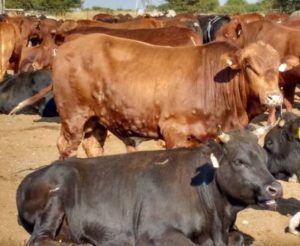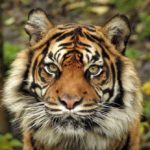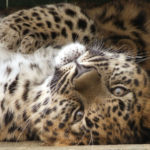From canine distemper to African swine fever, diseases have always been a considerable threat to global tiger populations. But while the world focuses on the COVID-19 pandemic, conservationists in Thailand are facing another infectious disease. Noticed at the beginning of 2021, Lumpy Skin Disease (LSD) is a viral infection spreading among domestic cattle in Thailand.
First identified in the 1920s, LSD spread throughout Africa and the Middle East before entering mainland Europe, Russia and Asia. Transmission occurs through insects such as mosquitoes and ticks, allowing the disease to jump from domestic cattle to wild ungulates. There are already reports emerging of disease transmission to banteng and wild gaur populations in National Parks, demonstrating potential widespread risk to tiger prey species.
Clinical signs
As the name suggests, affected animals typically develop skin nodules or lumps over the body. Other symptoms include fever, weakness, and a sudden decrease in milk production. While LSD currently has a low fatality rate in domestic cattle, no one is sure how it will impact wild species. Wild ungulates’ immune systems vary from domestic cattle and fatality rates could be higher and significantly impact prey species.
LSD in Khao Laem National Park
With recent surveys of Khao Laem National Park revealing more than 3,000 images of cattle being illegally grazed and records emerging of LSD cases amongst them in June 2021, conservationists are understandably concerned about spill-over events into the wild. To date, no wild ungulates are known to be afflicted but it is highly likely cases will soon emerge. Control of LSD is paramount but as cattle roam freely over a huge area it will be difficult to administer a vaccine and impossible to vaccinate wildlife.
The Ministry of Natural Resources and Environment has ordered a phased removal of cattle from all protected areas in Thailand and the KLNP Superintendent has made a commitment to mobilise the extraction. Work is now underway, but this process is likely to be prolonged due to the remote nature of the areas where cattle are kept and grazed. It may take 2 to 3 years to fully remove cattle from KLNP with no guarantees of success.
Rangers have been instructed to facilitate the removal in KLNP and the team at Freeland will assist. Activities will include a survey to estimate the scale of the problem, researching ownership of the cattle, and bringing in further stakeholders such as the livestock department and university expertise. Then a series of workshops will run to obtain agreement with farmers to remove their cattle during an amnesty and phase-out period.
In the long run, this virus outbreak may be beneficial as it will remove all the illegal grazers and reduce associated ecological disturbances from the parks. However, the next couple of years will be challenging as stakeholders contend with both poaching and this new emerging disease.
Find out more about the work Freeland is doing in KLNP this year here.




